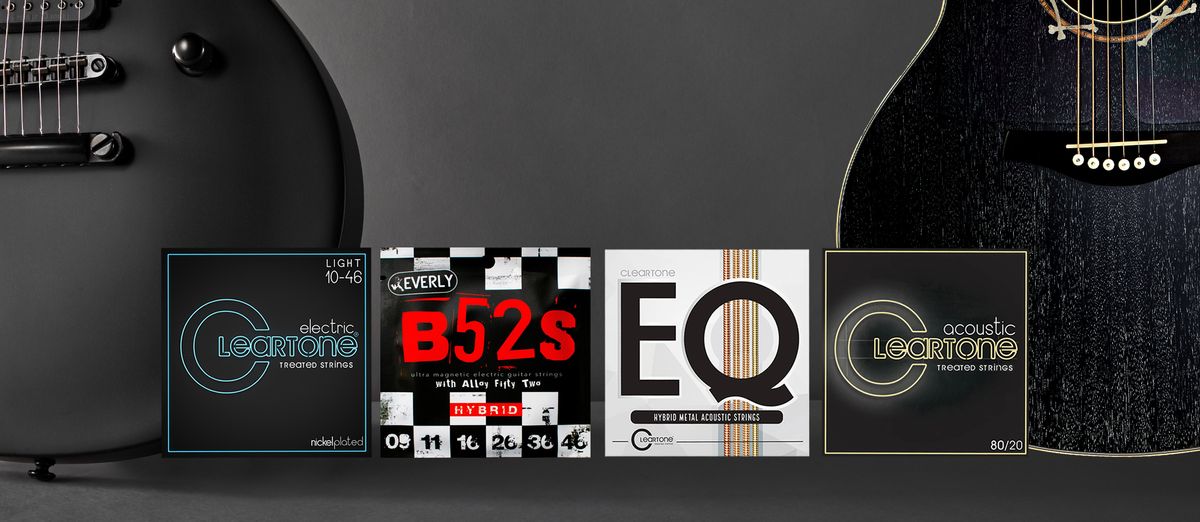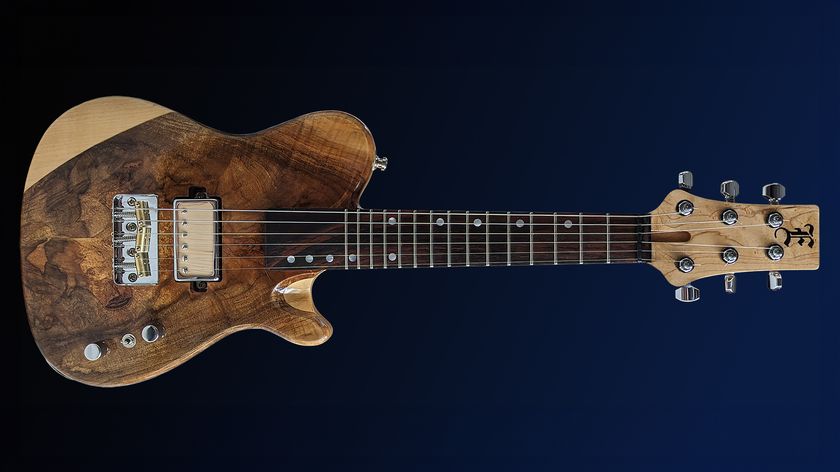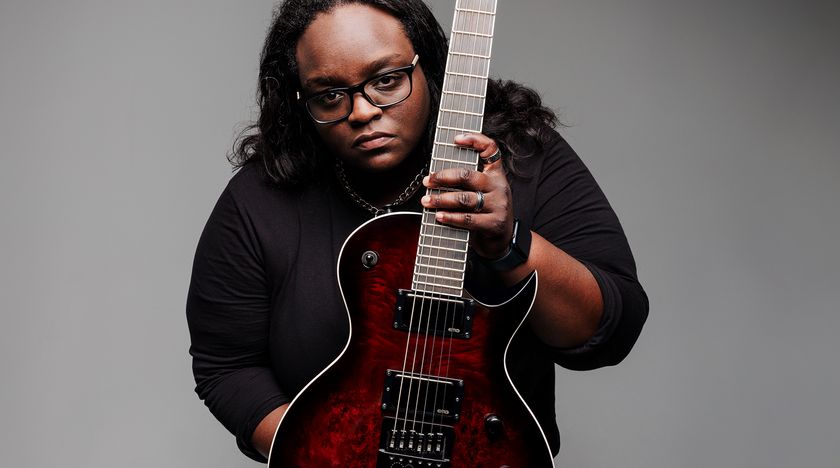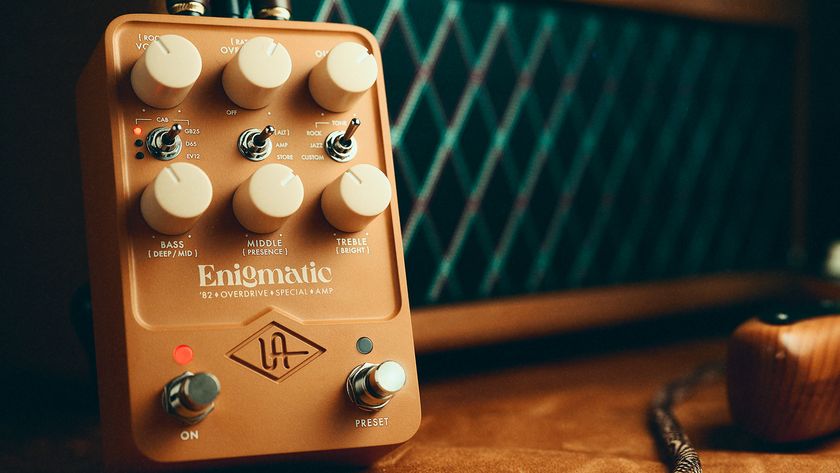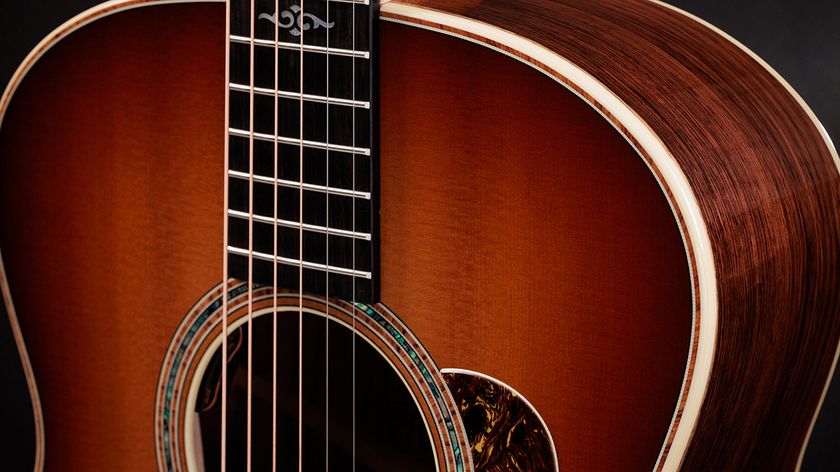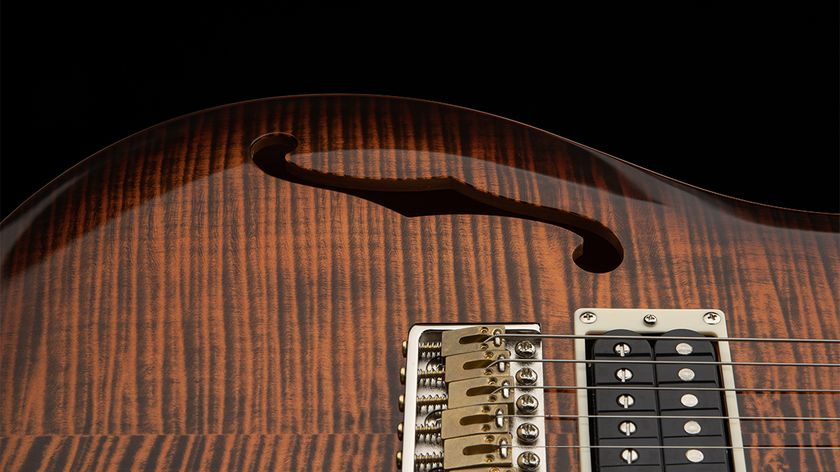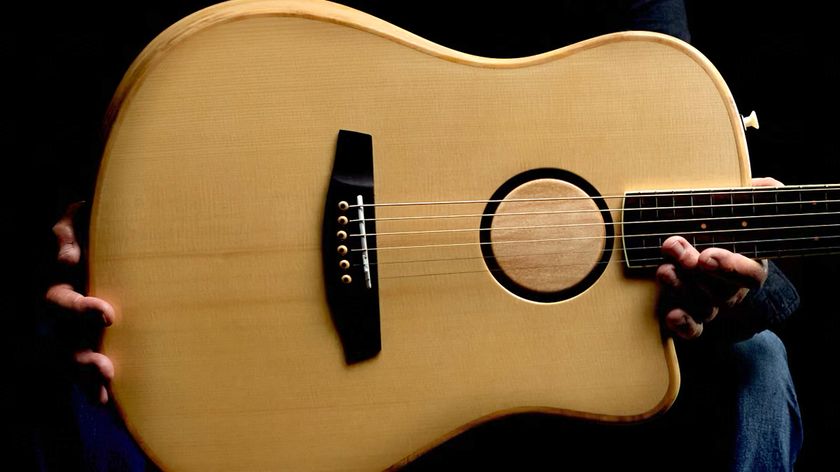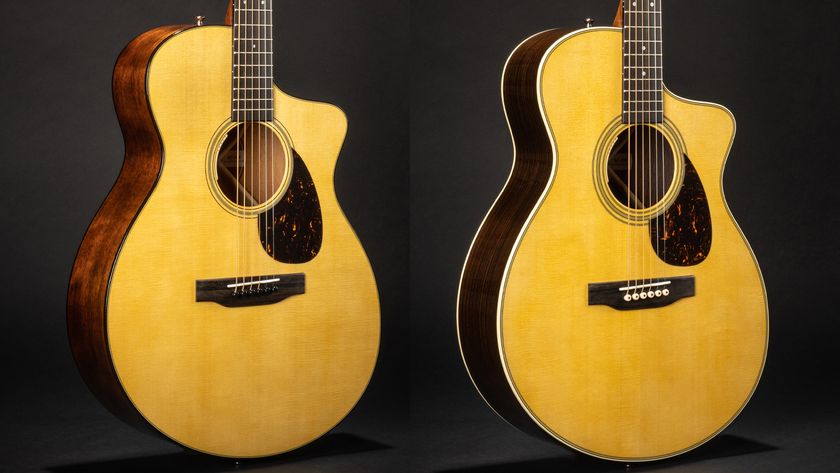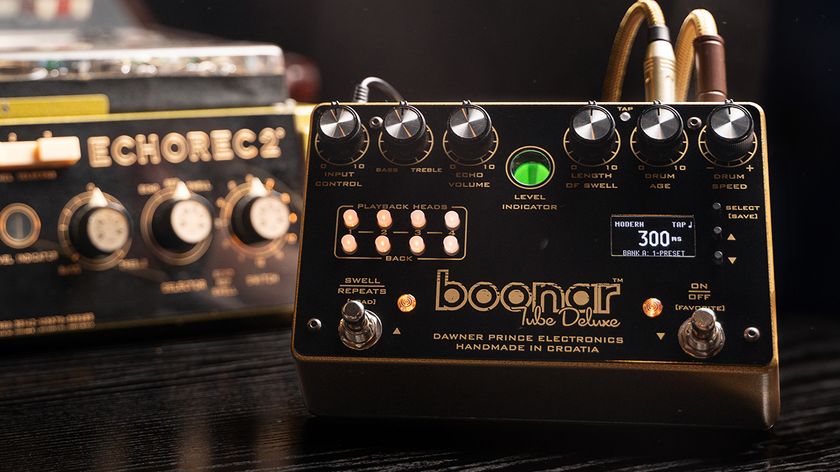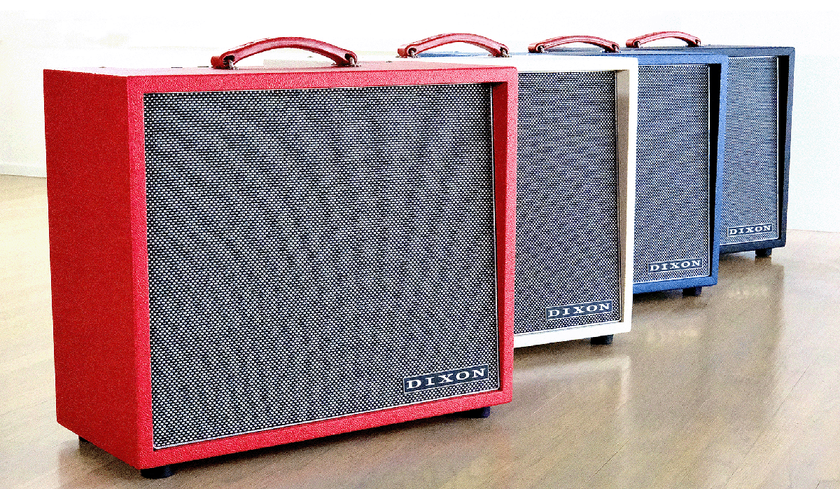GuitarPlayer Verdict
Cleartone's creative approach to guitar strings uses different compositions to meet the needs of acoustic and electric guitar players. The result is a range of treated and untreated strings that provide alternative choices in a traditional market. Each set tested delivered various nuances in tone, ranging from livelier response to fuller sound, and the treated strings felt smooth and pleasant, unlike the more plastic feel of other brand's coated strings. Although they cost somewhat more than untreated strings, they're also less expensive than treated sets from the competition. All in all, Cleartone is worth a look.
Pros
- +
Creative strings designs addressing a range of needs, and offering increased volume and longevity
Cons
- -
Pricier than traditional untreated strings.
You can trust Guitar Player.
Born out of R&D performed in the early 2000’s by none other than Phil Everly of the Everly Brothers, Cleartone was officially founded in 2008 to manufacture strings using several newly developed techniques, including a patented coating treatment that’s different from those used by other manufacturers of coated strings.
According to Cleartone, “The strings were designed from the ground up using custom-built, state-of-the-art string winders, and feature Phil Everly's patented core-to-wrap ratios. Our machines are built to run at higher tensions, creating more string wraps and denser strings, which makes them last longer and provides added volume and tuning consistency.”
Furthermore, the coating, which is featured on all but one set tested here, is purportedly thinner and more durable, while less apparent to the touch, than that used on other coated strings.
Selecting from among several types that Cleartone currently manufactures, I tested the EQ Hybrid Metal and 80/20 sets for acoustic guitar, and the Nickel Plated Treated Strings (a.k.a. “Blue set”) and Everly B-52s sets for electric. All are manufactured in the USA at Cleartone’s factory in Bountiful, Utah, using high carbon-steel core wire made in New York and wrap wire made in Kentucky.
Nickel Plated Treated Strings for Electric
$13.99
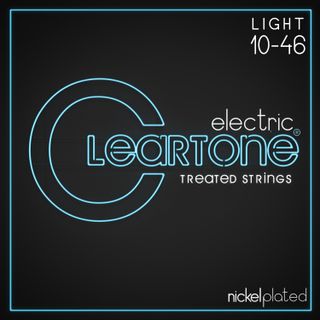
Cleartone claims “36% louder and 48% more sustain… and up to 5x the lifespan” for this set of treated, nickel-plated electric guitar strings compared to standard nickel-plated strings. While the first two numbers are difficult to quantify in a listening test, they did bring noticeably more power and bloom to the 2017 Gibson Les Paul Traditional I put them on.
The biggest takeaway, though, is that I heard a livelier overall sound, with a more multidimensional voice that enhances a certain chewy texture to the harmonics. They’re also very balanced across the frequency spectrum, with nothing jumping forward that wasn’t there with the previous set of strings.
In addition, the playing feel is a tad smoother, yet without the squeaky “plasticiness” under the fingers of some other coated strings. All in all, as an avowed string snob, I found them appealing, with a lot to offer as an alternative to the usual suspects.
Everly B-52s Electric Strings
$11.99
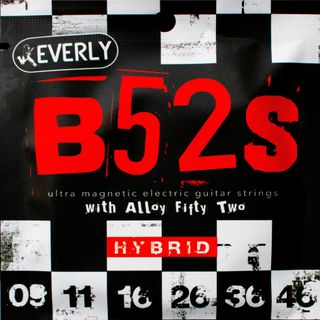
The only untreated/uncoated set in this selection, the Everly B-52s are specially designed to increase the magnetic interaction between strings and pickups. “They’re a unique offering made from Alloy-52,” Cleartone tells GP, “a fusion of iron and nickel. This gives them a brighter, punchier tone that won’t dull, making them ultra-magnetic electric strings ideal for high-power guitarists.”
Being somewhat of a contrarian, however, and less versed in the implied high-power and heavy-metal arts, I thought it would be interesting to try the B-52s in a more retro-leaning setting to see what they could coax out of lower-output pickups — that is, a pair of TV Jones Classics (Filter’Tron replicas) on a 2010s Gretsch Duo Jet.
After recording the guitar with its previous and relatively fresh set of popular nickel-plated strings, I strung it up with the .010–.046 Cleartone set provided, played a while, then recorded similar riffs and progressions at the same settings.
If not dramatic as such, the change was certainly apparent. They were notably more “muscular” sounding — with a little more “oomph” in the attack, and to some extent the mids — while remaining quite well-balanced overall.
The B-52s also offered enhanced high-end sparkle but certainly weren’t shrill. At the other end, their lows were firm and tight. It all makes for a meaty twang from the Gretsch and a lively playing response overall.
EQ Hybrid Metal Acoustic Strings
$13.99
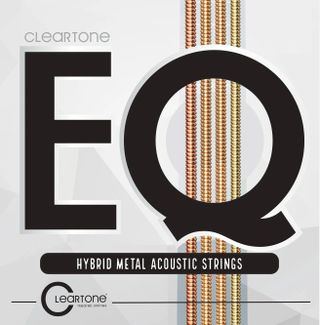
Another treated set, the EQ Hybrid Metal Acoustic Strings present an interesting approach to balancing string response from an acoustic guitar (hence the “EQ” moniker). The wraps of the low-E string are made from pure copper for its full bass response, the A and D wraps are phosphor-bronze “for its medium-low midrange fullness,” Cleartone says, and the G is 80/20 bronze to enhance midrange brightness. The unwrapped strings are traditional plain steel, and all received Cleartone’s patented treatment.
The hybrid-metals approach might at first seem an unusual one, but it’s not unprecedented: Telecaster players occasionally use components made from different materials for the three two-string saddles on the traditional bridge (often brass for the high E and B, steel for the G and D, and titanium for the A and low E) to achieve a satisfactory balance between the frequencies.
Loaded onto an Eastman E10SS — a sloped-shouldered dreadnought-style guitar with solid Adirondack spruce top and solid mahogany back and sides — the EQ set was perhaps most notable for what it didn’t deliver: any odd, unbalanced, or noticeably overbearing response from across the strings, despite the mixed metals. The overall effect was a full, even tone with plenty of new-string sparkle, but no brittle highs or boomy lows.
This set proved rich and full, detailed without ever sounding “hyped,” and very pleasant overall, while yielding a smooth feel under the fingers and no more (and arguably less) finger-squeak than traditional strings.
80/20 Acoustic Strings
$14.99
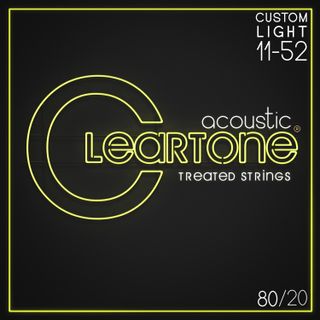
The 80/20 set for acoustic guitar features treated strings with bronze wraps made from 80 percent copper and 20 percent zinc. Cleartone declares a traditional acoustic response from these, yet with increased volume and sustain, and greater longevity as well thanks to the applied treatment process. I tested them on a 1996 Froggy Bottom H-12 flat-top, a 12-fret OO-sized fingerpicking specialist with solid Adirondack spruce top and solid Indian rosewood back and sides.
If the 80/20 set’s performance wasn’t dramatically different than a fresh set of traditional phosphor-bronze strings of the same gauge, they did seem notably livelier, well-balanced overall and slightly smoother to the touch. As a guitar with a 12-fret neck/body joint, the H-12 is surprisingly rich and full for its size, and it lost none of that girth with the Cleartones installed, arguably gaining a little more upper-midrange and high-end sizzle, and perhaps more composure in the bass.
Ultimately, this proved an appealing set that really brought out the most in the guitar, adding some zing and bite to fingerpicked parts without sacrificing fullness.
Conclusions
Although they were all different in their way, I was impressed with each of the four Cleartone sets I tested. Without getting too far into the weeds — and the particulars are detailed above — I felt each set arguably brought a little more liveliness and volume to their respective test subjects than other strings of the most comparable composition and gauge. As regards longevity, time will tell, but each remains bold and clear in the honeymoon phase and if that diminishes more quickly than expected, I’ll report back.
Overall, I’d say Cleartones are worth checking out, particularly for the company’s creative approach to designing different compositions for different needs, and for presenting several alternative choices in a market that — other than a handful of options — mainly toes the traditional line.
And although they cost more than traditional sets, they also cost less than coated sets from Elixir, Stringjoy and DR and may be less expensive in the long run given their extended life, while offering a smoother and more natural feel over other coated strings.
SPECIFICATIONS
CONTACT cleartonestrings.com
PRICES $11.99 – $14.99 each
ORIGIN USA
PRO Creative strings designs addressing a range of needs, and offering increased volume and longevity.
CON Pricier than traditional un-treated strings.
Dave Hunter is a writer and consulting editor for Guitar Player magazine. His prolific output as author includes Fender 75 Years, The Guitar Amp Handbook, The British Amp Invasion, Ultimate Star Guitars, Guitar Effects Pedals, The Guitar Pickup Handbook, The Fender Telecaster and several other titles. Hunter is a former editor of The Guitar Magazine (UK), and a contributor to Vintage Guitar, Premier Guitar, The Connoisseur and other publications. A contributing essayist to the United States Library of Congress National Recording Preservation Board’s Permanent Archive, he lives in Kittery, ME, with his wife and their two children and fronts the bands A Different Engine and The Stereo Field.

“Those people are full of it! If you can hear those nuances, my hat’s off to you!” Joe Bonamassa weighs in on the allure of P90 guitar pickups with Bon Jovi's Phil X
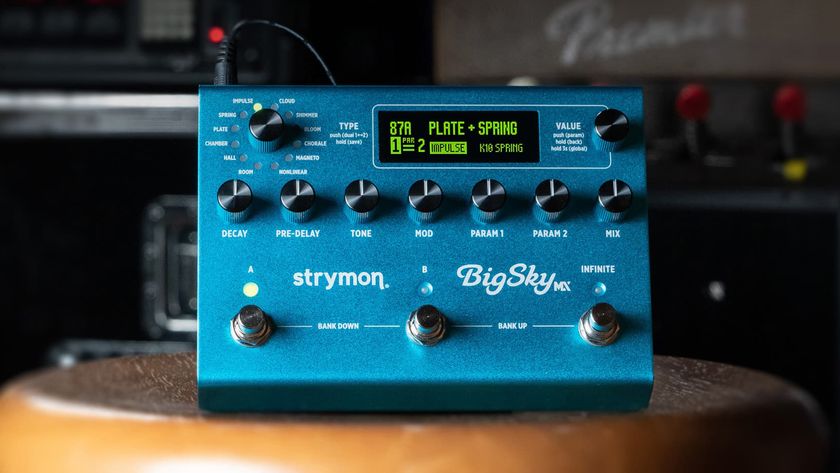
"BigSky MX will be replacing the BigSky as my go-to reverb pedal. I’ve heard nothing that covers all the bases with such pristine and detailed audio quality." We crowned the Strymon BigSky MX the champ of multi-reverb pedals
